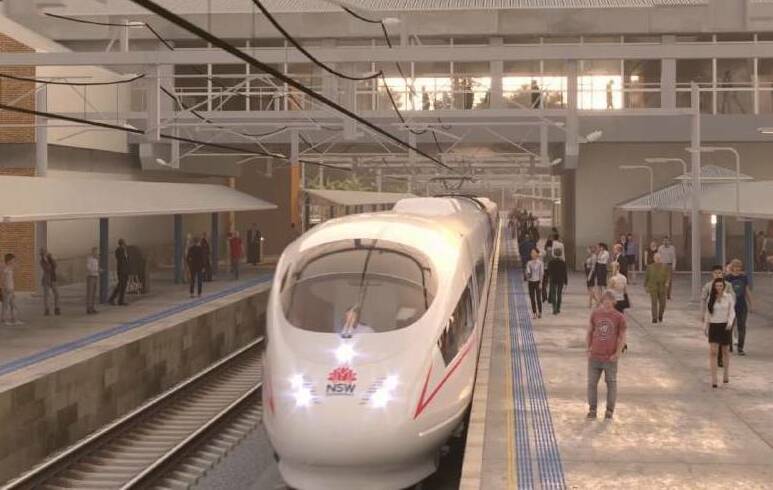
It has been compared to an episode of Utopia, but the federal infrastructure minister assures the government is "very determined to see" high-speed rail come to fruition.
Infrastructure Minister Catherine King spoke on ABC radio this week about the new High Speed Rail Authority, which commenced on June 13, saying while shovels wouldn't be in the ground straight away, detailed planning work was needed to get the project started.
"We're very determined to see it," Ms King said. "We're determined to be the government that does start this project, so I want to get the planning right first."
The Herald reported on June 6 the appointment of the High Speed Rail Authority board came after a long history of commitments but little action on the concept.
Western Sydney University economic geography Professor Phillip O'Neill has written numerous Herald columns over the years about the promises and plans made towards high-speed rail.
Professor O'Neill said it was hard not to be cynical about high-speed rail, given the government's track record.
Labor investigated high-speed rail last time it was in power in 2010, before then-Transport Minister Anthony Albanese flagged concerns the project would be costly and disruptive.
"It's cliché sure, but it's impossible to talk about Albanese's interest in high-speed rail and not use the word Utopia in the same sentence," Professor O'Neill said.
"There's no evidence to give anyone hope. It's beyond parody the fact this idea has been announced and re-announced."
The Utopia reference was brought up in Ms King's ABC radio interview, but she reiterated that her government was determined to see the project through.
The government has committed $500 million towards planning and corridor works, before the May 2023 federal budget outlined a $13.58 million spend over three years.
Professor O'Neill said while the federal government had appointed a board with "substantial expertise", he held concerns about how it would staff the authority.
"Unfortunately the recent history of staffing of new public agencies is disappointing," he said. "It's difficult to see the new authority will have the resources or the grunt to secure the level of talent and expertise in its full-time professional staff, capable of doing the job.
"Why would the best people work for a modest public sector salary on a fixed term appointment rather than work for one of the global infrastructure companies?
"The worry then is that the new authority will struggle for ideas and importance and influence because of its temporary ad hoc nature."
But Professor O'Neill said high-speed rail wasn't the actual issue.
"The issue is how do we enhance connectivity of the Hunter," he said.
With the east coast being key to Australia's economic future and an attractive place to live, Professor O'Neill said "Newcastle is positioned exactly where you would want to be".
"The problem however is that Newcastle is peculiarly isolated by its transport and communication circumstances," he said.
"It still suffers from early 20th century railway connections. It's M1 connections, while adequate still remain a way the city is connected from the mid 20th century. The city has an airport that is the region's little doer but it struggles to develop a genuine position on the eastern seaboard air network."
He believes high-speed rail planning and improvements to the existing train line should be happening concurrently.
"The two are not alternatives," he said.
"The service should have been improved incrementally over the past half century. The fact it is now in such a pathetic state shows the neglect of connectivity in Newcastle for a long, long time."
Committee for the Hunter CEO Alice Thompson agreed, saying she did not want to see the state and federal government's joint $1.5 billion commitment to improve the existing line "kicked further down the road on account of a new approach to high-speed rail".
"We also seek more understanding on how the duplication of rail at Wyong forms part of a program for faster rail promised for this important corridor," Ms Thompson said.
However she said the committee welcomed the Commonwealth's leadership on high-speed rail.
"We maintain that with vision and imagination, better rail... could be truly region-shaping and set the structure for a larger and more diverse regional economy and higher living standards," Ms Thompson said.
"With record immigration and the majority destined for NSW, the Hunter is poised to do more heavy lifting on population, jobs and housing at arguably a fraction of the costs of absorbing this growth in Sydney.
"To do this, we need confidence of a bigger plan for settlement across the nation and state, and the enabling infrastructure like better public transport, schools and health to support growth so we can capture the benefits and sustain the high quality of life Hunter communities enjoy."
Newcastle lord mayor Nuatali Nelmes said the Newcastle Greater Metropolitan Plan had identified high-speed rail as a "critical initiative to provide Greater Newcastle with access services and employment opportunities."
"City of Newcastle has consistently advocated for need for the Newcastle to Sydney Fast Rail strategic business case to be prioritised and corridor planning initiated," she said. "So the federal government staying true to their commitment to high speed rail, starting at Newcastle is welcome news."
WHAT DO YOU THINK? Join the discussion in the comment section below.
Find out how to register or become a subscriber here.







